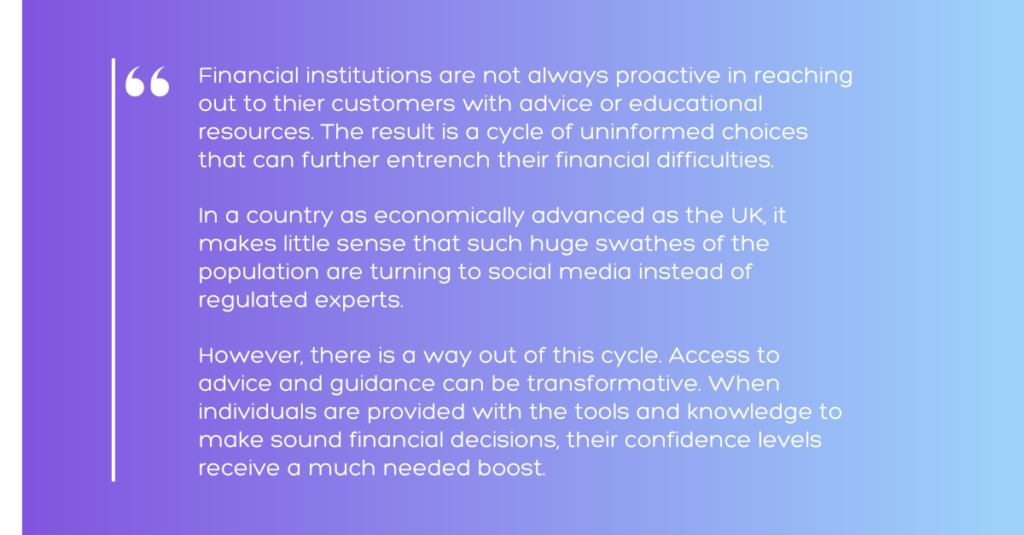2023 has seen UK financial services embrace more customer-centric policies and guidelines (Consumer Duty and the Mortgage Charter, to name just two).
We are unanimous in our belief that the culture of our industry needs to change to protect the customers we serve. But, while we’re all nodding and agreeing, we’re leaving out an important step of the process: the widening gap between where we are now and where we need to be. It’s not enough that we know what customers need – it is a reciprocal relationship and those customers have to agree to be part of the team. They need to engage with the new initiatives we’re offering and become enthusiastic partners in the quest to reach their own financial goals.
This sounds like an easy win on paper – who wouldn’t want the country’s experts helping them to financial freedom? Well, a lot of people, it turns out. In the digital era, the competition for time, attention, and – most importantly – engagement is fierce. People are increasingly turning to their favourite content creators on TikTok and Instagram for financial advice, highlighting not only our failings in the digital sphere but also the lack of authority and trust a large percentage of people have in their financial institutions.
In the current climate, people often need to solve the problem right in front of them rather than meditate on how that might impact their futures. This leads to impulsivity and a desperate will to believe a quick-talking influencer in a 30-second video. Small print isn’t exciting, and sensible explainer leaflets get thrown straight in the bin.
So how do you solve a problem like engagement?
Understanding the Generational Shift
Those turning 18 this year were born in 2005, which means communication has always been digital. With the release of the iPhone in 2007 came the advent and convenience of downloadable apps, so for the younger generations accessing financial services today, information and interactive content have always been immediate.
And while an 18-year-old applying for a mortgage is rare, this expectation of immediacy and convenience in communication is not. The cultural shift to digital isn’t a tick-box exercise firms can achieve with a Facebook page. It’s in accepting that all information is now consumed online – and if you’re not making an effort to meet them where they are, they’ll get their information elsewhere.
Einstein famously once said, “Insanity is doing the same thing over and over again but expecting different results.” The same can be applied to customer engagement. If financial institutions continually employ the same tired paper-based strategies for customer journeys, it’s no wonder people are looking elsewhere for their information.
Analysis and Reflection
This seems like an obvious one, but taking the time to assess what is working and what isn’t within the customer engagement strategy is paramount. And taking it one step further, this analysis and reflection must inform where that strategy goes next. It must stay fluid, adapting to changing digital trends and events.
The most successful financial services brands are over 5x more likely to experiment with customer journeys and campaigns, making data the driver in all decisions to improve the impact of their presence. In addition to this, they were also more likely to make sure employees were trained on customer engagement approaches and technology.
Engagement is customer-led. Taking the time to review past performance will set firms up for success in the future. We shouldn’t be guessing – the evidence is already there.
Financial Technology
Financial institutions are understandably wary of implementing new technologies for their customer base – the stakes are high. But if we revisit our assertion that the culture of financial services needs to change, there’s one overriding reason FinTech companies should be taken seriously – their motivation for starting.
FinTech companies exist to solve problems – starting not with products but with customers and the overriding belief that processes can be improved to benefit them.
Companies like Eligible exist to cater to unmet customer needs, creatively finding ways to enhance user experience. AI raises the bar for interaction and engagement, where customers do not have to wait for an email or a phone call to have their questions answered. Complex algorithms can predict what information a customer might need next based on an established, two-way dialogue where proactive contact can gauge understanding and stress levels. Technology adds infinite value to the scaleability of thousands of interactions every time a customer logs in.
With this kind of personalisation, Eligible clients see up to a 300% increase in customer engagement rates. What this means is that customers are establishing a new trust with their institution while simultaneously improving their own financial literacy and taking charge of their product options.
If you’re interested in transforming your customer experience and giving your customers the very best that digital servicing has to offer, book a demo with us today!



